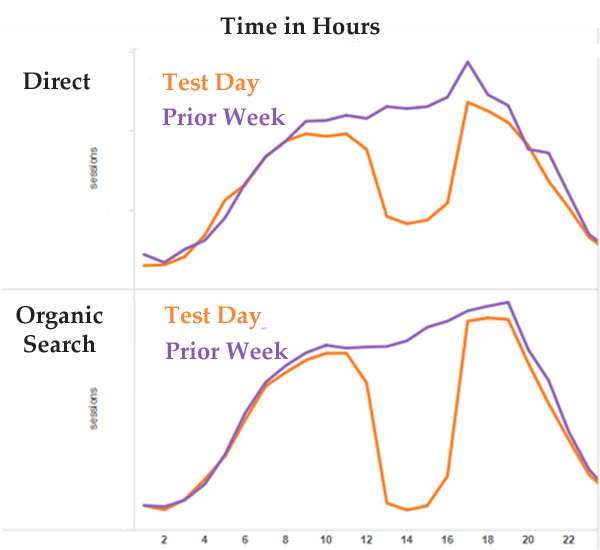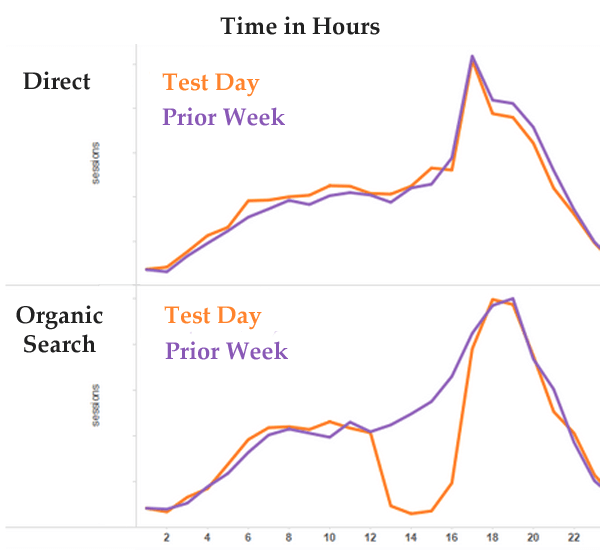Experiment Shows Up To 60% Of “Direct” Traffic Is Actually Organic Search
Everyone knows that browsers don’t always report where visitors came from when they arrive at a website. When they don’t report where they were in the Hypertext Transfer Protocol (HTTP) referrer header, often the traffic is considered “Direct” — which really means, “we have no clue where they came from, maybe they typed the URL […]
Everyone knows that browsers don’t always report where visitors came from when they arrive at a website. When they don’t report where they were in the Hypertext Transfer Protocol (HTTP) referrer header, often the traffic is considered “Direct” — which really means, “we have no clue where they came from, maybe they typed the URL in or hit a bookmark.”
We’ve all lived through changes that have impacted Direct traffic as recorded by our analytics programs. Remember back in September 2012, when iOS 6 was released and suddenly lots of sites lost organic search traffic but gained an equal amount of direct?
And let’s not forget when Apple fixed it in July 2013, and the shift from Organic to Direct largely corrected itself within about a week.
Not to mention Google’s shift to encrypted search, making “not provided” a household phrase, within search circles, anyway.
There are legitimate reasons why browsers shouldn’t report where they have come from. The HTTP technical spec (RFC 2616) says when traversing from an HTTPS site to an HTTP site, a browser should not report where it was. And users can set privacy settings that instruct their browsers never to report this at all.
In testing with default browser settings, we’ve found differences based on whether you perform a search at Google directly vs. in a browser’s search box, or based up which version of an operating system you are running. Getting a referrer is unreliable, which means organic traffic measurements are unreliable.
But all this has been known for some time. What hasn’t been known — and what is the bane of all SEOs fighting for budget — is that we know some percent of Direct is really Organic, but we don’t know how much. Until now.
Don’t Try This Experiment At Home
At Groupon, we conducted a potentially dangerous experiment to give us the answer. We don’t recommend you try this at home, but having great confidence that Google could index a site really quickly, we completely de-indexed our site one day.
That’s right — for the sake of SEO science, we deindexed ourselves completely for about 6 hours. We know what you’re thinking, but we assure you that this was not just an accident that occurred during use of the remove-this-URL-from-the-index feature in Google Webmaster Tools.
During this test, we examined Organic search and Direct traffic by hour and by browser to any page with a “long” URL, like www.groupon.com/local/san-francisco/restaurants. We define long as being at least in a sub-folder, so this excludes the home page and top level folders like /coupons, /getaways, etc. (We excluded these “short” URLs because those are pages that actually do get a fair amount of Direct traffic — on the homepage, Direct really is Direct.)
In the chart below, the orange line shows hour-by-hour sessions from Direct and Organic during the test period for long URLs. The purple line represents the control sample — it is recorded traffic for the same time period on the same day in the prior week for the same URLs.
I’ve hidden the actual numbers in the left hand axis, but you can see that traffic attributable to SEO efforts drops to near zero from about 13:00 to 16:00. At the same time, Direct visits fell 60%.
Variance by browser type is significant. Desktop browsers generally report their Organic search referrals better, except for IE where about 75% of Direct traffic from IE to long URLs is actually attributable to Organic search from Google. (We have not risked de-indexing ourselves from Bing in the name of SEO science, yet).
About 10-20% of Firefox, Chrome and Safari desktop traffic reported as Direct is actually Organic. In general, mobile browsers are less likely to report their referrals from Organic search accurately. The chart below shows traffic from mobile only — and the drop in Direct traffic during the test period is about 50%.

Drop In Organic & Direct For Mobile Browsers During Test Period Vs. Prior Week
The Exception To The Rule
The one exception seen to our rule — that 60% of Direct traffic to “long” URLs is really Organic — was on our deal pages. Groupon deal page URLs are typically long enough that a user is unlikely to key them in manually, and they are new enough (and expire quickly enough) that users are unlikely to have them bookmarked or remembered in their browser auto-complete, so one might think we’d see the same effect.
In the chart below, we see Organic and Direct traffic comparisons for our deal pages only. As you can see, there is no significant drop in Direct for these pages.
Perhaps the absence of drop-off in Direct here is because the % of traffic to these pages is much higher from other, non-SEO influenced sources, such as social networks and personal emails (not email from Groupon whose tracking codes provide accurate attribution).
This might mean SEO isn’t the only channel losing out on credit due to browsers hiding referrers, but link referral campaigns could be suffering as well. (If anyone can suggest a way for us to unlink us from every other website on the planet for a few hours, we’ll test that theory.)
If you want to analyze this yourself, I don’t recommend deindexing your own site(s) — but our experience may serve as a useful comparison. Our testing shows that, for a site getting in the ballpark of 50% mobile web traffic, the 60% of the traffic to long URLs reported as Direct is probably Organic traffic from Google.
You could probably assume that Organic traffic from Bing is similarly over-reported as Direct proportional to Bing’s share. If a significant percent of your traffic is to long URLs, then your Organic traffic — and therefore the value of your SEO — is significantly understated.
Stock image used with permission of Shutterstock.com
Contributing authors are invited to create content for Search Engine Land and are chosen for their expertise and contribution to the search community. Our contributors work under the oversight of the editorial staff and contributions are checked for quality and relevance to our readers. The opinions they express are their own.
Related stories
New on Search Engine Land

